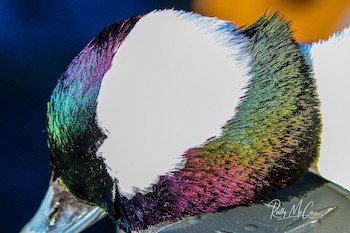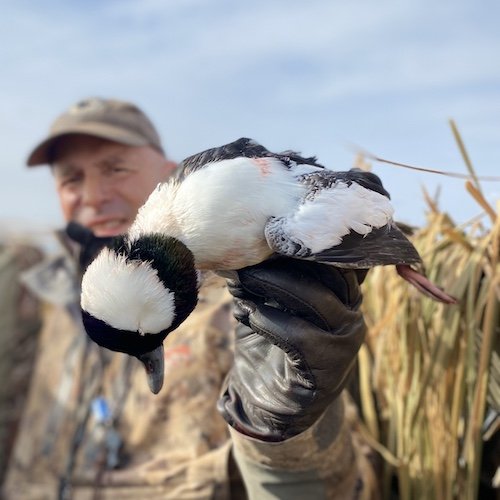Bufflehead

Bufflehead (Bucephala albeola) is coined from “buffalo-head,” comparing the small diving duck’s remarkably over-sized head to that of a bison. Bucephalas literally translates to “ox head,” implying that all 3 golden-eyed ducks within the genus have extraordinarily large heads. In the right light, the bufflehead drake’s black head shimmers like an oil slick, showing magnificent green to violet iridescent arrays.
Bufflehead drakes have a prominent white area surrounding the back of its head. Bills of both sexes are short and blunt, males and females both displaying bluish gray coloration. The hen bufflehead’s bill matches their legs and feet. Bufflehead drakes have large bubblegum-pink legs and feet, which are easily seen in flight along with their unusually long tail for divers. The drake’s wings have a unique white patch originating in the speculum and extending diagonally through the upperwing coverts. Females have plain brown heads with white streaks daintily painted on each cheek, and overall gray brown plumage.
Available Hunts
-
Arkansas Duck Hunting
Arkansas duck hunting camp experience on one of the state's most coveted properties. Location, location, location - smack in the middle of a 6,000- acre federal sanctuary, the area literally swarms with ducks daily.
...read more- Exclusive property surrounded by federal sanctuary holds many ducks for the entire Arkansas duck hunting season.
- Predominately mallards, pintail, gadwalls, green-wings and more
- Spacious, covered blind holds up 8-10 guns is very easily accessed with short, dry walk. Leave the waders at home!
- Large, deluxe 4-suite lodging
- Excellent home-cooked meals provided
- Located 30 minutes from Bastrop, 1 hour from Monroe, LA
- Corporate group rates
Rate: $650 day -
Louisiana Duck Hunting – Coastal Marsh at Venice
Never more than 3 steps away from the duck blind - Inclusive package for individuals, families, and corporate groups that want to cast or blast (or cast and blast) while living it up like cajun kings.
...read more- Coastal Louisiana duck hunting, inshore or offshore fishing, perfect Cast & Blast
- Premium lodging and excellent chef-prepared meals featuring regional specialties
- Spacious lodge sleeps up to 18
- Accepts booking 1-18+ (no mixed groups)
- Excellent early blue-winged teal hunting (September), regular duck season November-January)
- Plus inshore and offshore fishing
Rate: $500/day -
Mexico Duck Hunting Obregon
Mexico duck hunt combo for real duck hunters. All-day hunts for broad variety of Central Flyway and Pacific Flyway duck species.
...read moreMexico duck hunting combo in Obregon is an action-packed “real duck hunters duck hunt” for ducks, doves, options for trophy bass fishing and quail.
- Trophy duck species for nearly all Central and Pacific flyway species to include cinnamon teal, Mexican mallard, more!
- Generous bag limits
- Elegant and Gambel’s quail, trophy largemouth bass fishing options
- Premium, 9-bedroom estancia and unequalled guest services
- Featured – Wildfowl, World of Beretta, MOJO TV, Outdoor Life, NRA Hunter, more
Rate: $4,880 (4-day hunt) -
Mexico Duck Hunting Sonora
Mexico Duck Hunt package is intended for private groups of 4-7 hunters.
...read moreMexico Duck Hunting Sonora Combo was developed at the request of many repeat clients who wanted to enjoy morning Mexican duck hunting, afternoon dove hunts, with their own exclusive groups.
- 4-night, 3-day packages, January-February
- For private groups of 4-6 hunters
- Morning duck hunts, afternoon dove hunts
- Premium, 4-bedroom estancia, all bedrooms with ensuite facilities
- Excellent waterfowl species selection
Rate: $4,080 (3-day hunts) -
New England Sea Duck Hunting
World renown for its eider hunting, New England waterfowling offers an incredible change of scenery and is an excellent place to check off lots of North America waterfowl species. Codfather Charters specializes in making your hunt priorities a reality.
...read more- Decade-plus experience for trophy eiders, other sea ducks, divers, dabblers, mergansers, geese
- Best place in US to harvest prime American black ducks
- Customized hunt plans reflect hunter priorities, not a “one size fits all” type 1/2-day hunt
- Includes hotel accommodations, full-day hunting, continental breakfasts, made-to-order lunches
- Recognized as foremost among US waterfowl collectors and taxidermists
- Nearby non-hunting spouse activities abound
Rate: $2,500 for 3-day inclusive package -
Texas Waterfowl Hunt – Desert Paradise
Texas waterfowl hunt packages features relatively unpressured ducks, geese and sandhill cranes in an area so large it takes 3 lodges to cover and so ecologically diverse that most Central Flyway waterfowl species can be hunted!
...read more- Inclusive Texas waterfowl hunting packages for ducks, geese, sandhill cranes, doves, early blue-winged teal, spring turkeys, more.
- 3 lodges to cover vast, relatively undisturbed waterfowl hunting area and to offer flexibility for desired bucket-list species, amenity-level needs, or personal budget
- Central flyway puddle ducks to include prized mottled duck, Mexican duck, cinnamon teal, fulvous whistling duck, black-bellied whistling duck opportunities all right here in USA
- Sandhill crane hunting and white-fronted goose hunting are the Speck Ops Waterfowl house specialties
- Luxurious lodging with over-the-top and fun activities provide fun for bachelor or business hunting groups, entire families and non-hunters,
Rate: $2,000 to $2,900
 One of the few times bufflehead are found outside of the water is during the breeding season. Their breeding zone encompasses most of Canada and Alaska, with a few breeding in Washington, Idaho, Montana, Oregon, California, and Wisconsin. The majority are found in British Columbia, Alberta, Yukon, and Saskatchewan. Buffleheads will either nest in natural cavities made by woodpeckers or manmade nest boxes. Natural cavities in aspens are preferred, unless this species is found in California, in which case they are most often found using pine trees. Unlike many duck species, buffleheads are mostly monogamous, remaining with the same mate several years. Even though they are a diving species of duck, the ducklings are sometimes seen dabbling. After the breeding season, buffleheads migrate throughout the U.S. and Mexico. Highest concentrations are along both United States coasts. Their distribution is much more widespread than their goldeneye counterparts.
One of the few times bufflehead are found outside of the water is during the breeding season. Their breeding zone encompasses most of Canada and Alaska, with a few breeding in Washington, Idaho, Montana, Oregon, California, and Wisconsin. The majority are found in British Columbia, Alberta, Yukon, and Saskatchewan. Buffleheads will either nest in natural cavities made by woodpeckers or manmade nest boxes. Natural cavities in aspens are preferred, unless this species is found in California, in which case they are most often found using pine trees. Unlike many duck species, buffleheads are mostly monogamous, remaining with the same mate several years. Even though they are a diving species of duck, the ducklings are sometimes seen dabbling. After the breeding season, buffleheads migrate throughout the U.S. and Mexico. Highest concentrations are along both United States coasts. Their distribution is much more widespread than their goldeneye counterparts.
Bufflehead foraging sites are shallow waters with little to no vegetation, and food is usually consumed when they are still underwater. This species has also been observed foraging on mudflats. The bufflehead’s diet primarily consists of aquatic invertebrates such as shrimps, crabs, and snails. They also eat small fishes, pondweeds, and bulrushes. From New York finger lakes to Mississippi River oxbow lakes, sizable rafts can be encountered on large freshwater bodies where they respond readily to decoy spreads. A common hunting tactic is to place a single or couple bufflehead head decoys outside the pocket. Proving birds of a feather flock together, they nearly always seem to fly into these decoys. Have heard buffleheads called “butterballs” but don’t know how this nickname originated.







